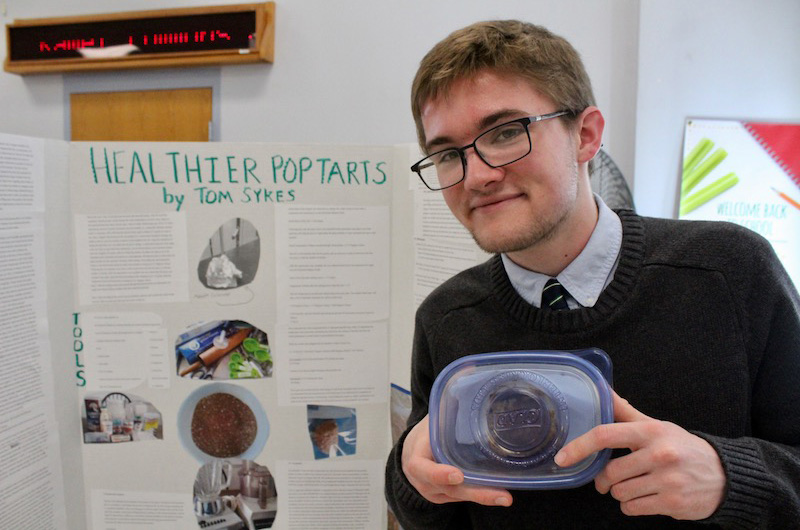Cardboard rockets, lemon batteries and “healthy” Pop-Tarts were just a few of the projects displayed at the annual high school science fair Saturday morning that would have made Bill Nye the Science Guy swoon.
Thirty-six projects filled the cafeteria as hundreds of people wandered around the room, checking out the displays and listening to presentations. Each entry was reviewed several times the day before by a group of 30 judges, including professional scientists and engineers from the community.
“This is a great opportunity for kids to really dive in deep into something they’re really interested in,” said first-time organizer and MVRHS chemistry teacher Jason Neago. “Science is fun and an opportunity to get your hands dirty and try to make sense of what you’re observing in the world.”
Junior Tom Sykes created a makeshift calorimeter and baked Pop-Tarts from a recipe he devised to cut the calories per gram down to .22 from 4.17.
“I wanted to redesign the brown sugar cinnamon,” he said. “I thought, why not take a food considered so unhealthy and change the process behind it to make it healthier for the public?”
Science fair judge and pediatric dentist Bruce Golden said he was impressed by the project, though he’d like to see it tested a few more times before adding the new treat to his breakfast routine.
“These kids are the science winners,” Dr. Golden said. “I think it’s the best and brightest of our kids that are willing to put themselves forward to show a project. Exposing yourself really requires a certain fortitude of spirit.”
The fair also brought back the wind turbine competition. Second-place winners Owen Favreau and Jaiden Edelman’s turbine used a rubber-band pulley and managed to produce enough volts to charge a phone.
“Every time we increased the height of the turbine, we increased the energy output,” Owen said.
After the showcase, the awards were announced. Freshman Henry D’Andrea won first place for his project Can Bacteria Grow in Space Without a Spacesuit? He started working on the project in middle school when he learned bacteria can breathe without oxygen.
“I was like, does that mean they can go to space?” he said. “The answer is yes! They’re almost completely fine.”
He emphasized that he couldn’t have completed the study without help from his teachers who took time after school and on weekends to help him. He added that he’s keen to continue his research for next year’s fair.
“I’m just astonished. I did not expect this at all,” he said. “I wasn’t expecting to be able to get it done, but I put in the effort and it worked.”
Mr. Neago said he hopes the students continue to work on their projects outside of the classroom.
“The big thing is the community piece, realizing that they may have worked on this small project but there’s a lot of other opportunities outside of this,” he said. “I’m hoping that they can see how their project fits into the bigger piece.”
Awards
1st Place Overall: Henry D’Andrea (Can Bacteria Grow in Space Without a Space Suit)
1st Place Investigative Project: Henry D’Andrea - Can Bacteria Grow in Space Without a Space Suit
2nd Place Investigative: Graham Stearns - Finding Mercury Levels in Local Fish
3rd Place Investigative: Ingrid Moore and Ben Yancey - Got Water?
1st Place Engineering Project: Chloe Combra and Kate Howell - Degradable Water Cup
2nd Place Engineering Project: Jaiden Edelman - Portable, Refracting Telescopes for Science Outreach
3rd Place Engineering Project: Owen Steenkamp and Mike Wallace - Simply Still
Wind Turbine Competition Awards
1st Place: Peter Burke and Vito Aiello
2nd Place: Owen Farveau and Jaiden Edelman
3rd Place: Enrique Contreras and Catherine Cherry
Shark Tank Competition Awards
1st Place: Isabella Thorpe and Ruby Reimann - SolCharger
2nd Place: Max Potter and Willa Welch - MVRHS Connect
Sheriff’s Meadow Foundation Award
Winner: Chloe Combra and Kate Howell - Degradable Water Cup The David Brand Award Winner: Lucas Goncalves and Cicero Batista - Could GMOs Save Areas Undergoing Drought The Marine and Paleobiological Research Institute (MRPI) Award Winner: Parker Ben David and Matthew D’Andrea - Testing Solar Panel Efficiency in Water
Sustainability Award
Winner: Chloe Combra and Kate Howell - Degradable Water Cup
Lagoon Pond Association Award
Winner: Graham Stearns - Finding Mercury Levels in Local Fish
Biology Award
Winner: Ciara Hoyt and Charlotte Packer - In Home Hydroponics System
Physics Award
Winner: Jaiden Edelman - Portable, Refracting Telescopes for Science Outreach
Chemistry Award
Winner: Oliver Dorr and Rusiri Mullin - Lemon vs Penny Battery
Technology Award
Winner: Jaiden Edelman - Portable, Refracting Telescopes for Science Outreach









Comments
Comment policy »